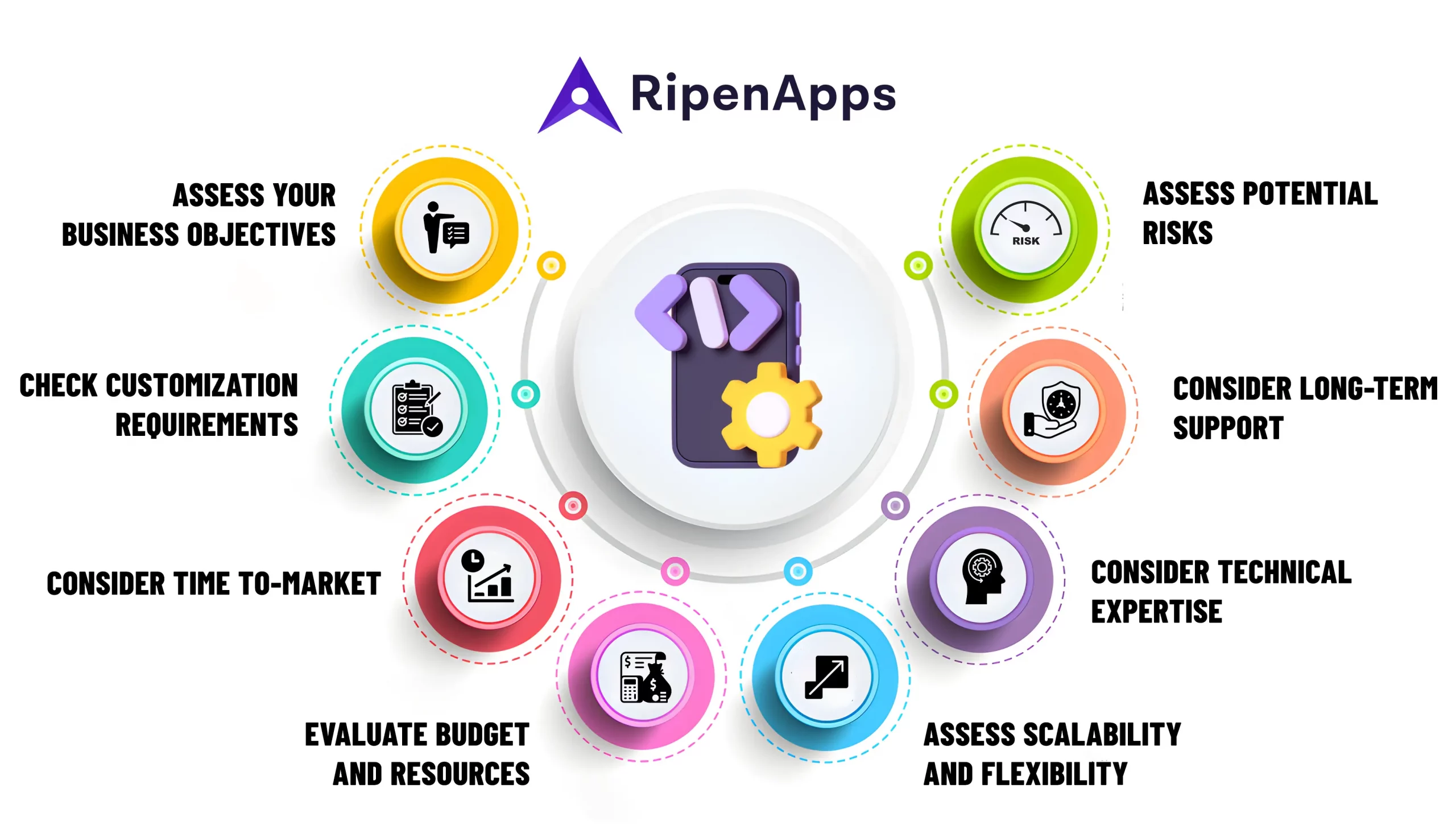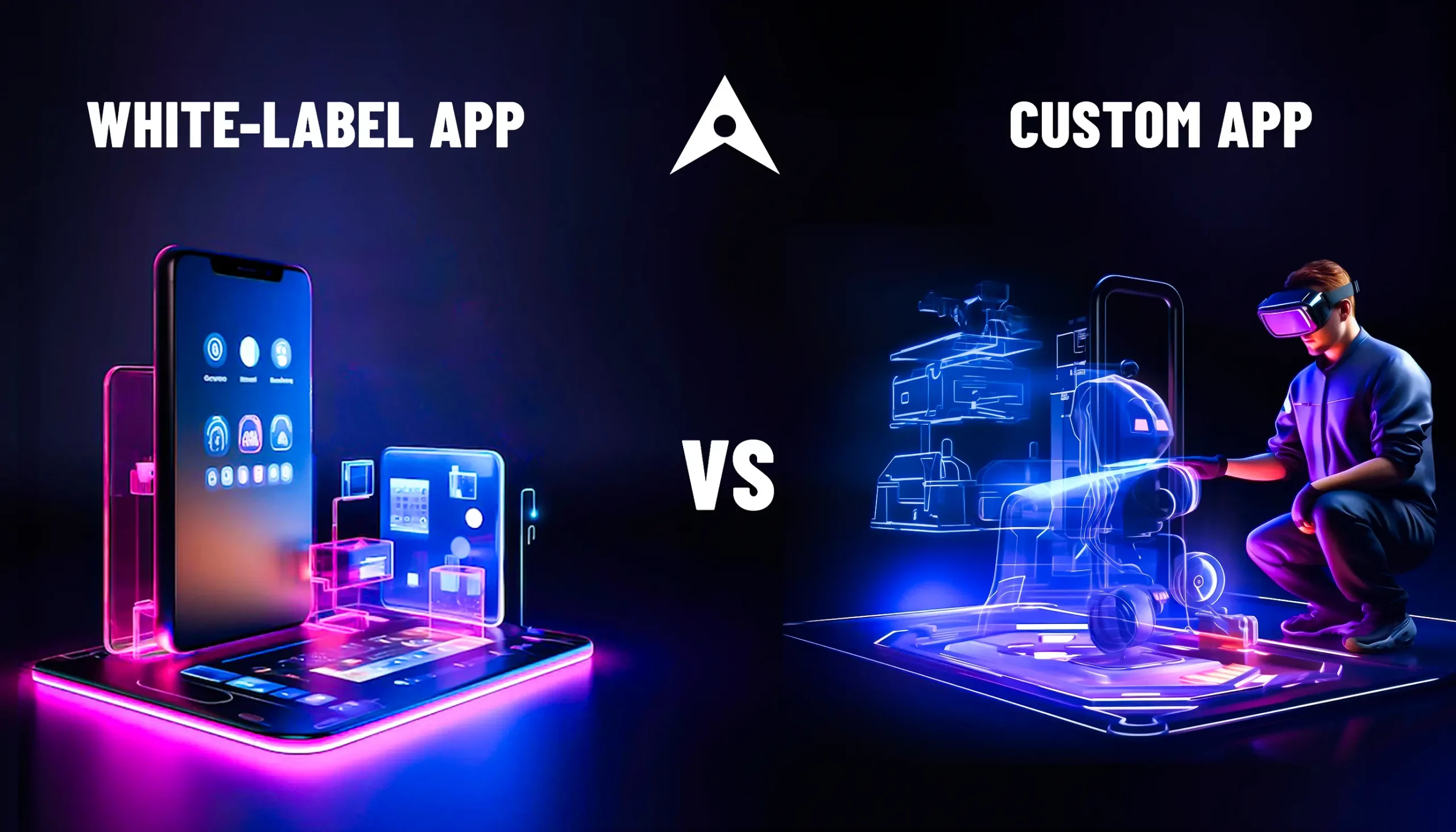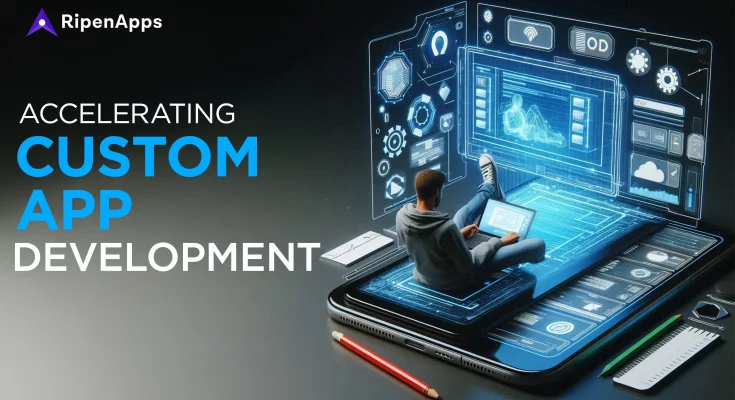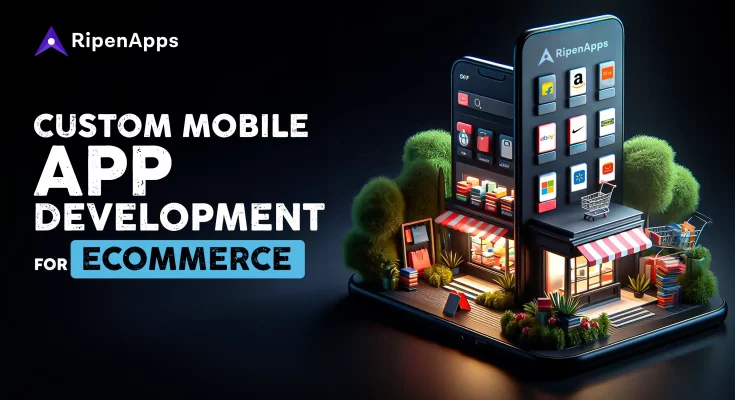When it comes to a mobile app, most business people are often confused in choosing between these two options. First, either directly purchase ready-made or white-label app solutions from an agency.
Or collaborate with a custom mobile app development company to build a custom mobile app as per specific business requirements.
This choice plays a decisive role in achieving long-term business success since the development approach directly impacts the overall performance and revenue outcomes. Startups and small businesses generally have limited budgets. They find it difficult to invest huge amounts of money in custom app development.
Whereas, white-label apps are highly cost-friendly and faster to launch as compared to custom apps. But it doesn’t allow for customization. Therefore, many times this choice becomes highly important since it impacts the budget and the app’s success.
So which approach is ultimately beneficial for businesses custom app development or white-label app solutions? In this blog, we will analyze all the key differences and aspects and compare them to determine which approach is better for your business.
Table of Contents
What is Custom App?
A custom app is also known as a bespoke or tailor-made app. It is a software or mobile application developed specifically for a particular client or organization to address their unique needs, requirements, and business objectives. Custom apps are designed from scratch starting with the client’s specifications and preferences. They offer a tailored solution that perfectly aligns with your business objectives, workflows, and user needs.
What is a White-Label App?
A white-label app is a pre-built software or mobile application developed by a third-party provider or a mobile app development company. This app is licensed to other businesses or organizations for rebranding and customization.
Unlike custom apps, which are built from scratch to meet specific requirements, white label applications are designed to be generic solutions. They can be easily rebranded and quickly customized to fit the needs of popular use cases and market needs.
Advantages of Custom App Development
Custom app development offers numerous advantages. When you invest in custom app development, you can effectively address your specific business needs and achieve strategic goals with greater efficiency and effectiveness.
According to market reports, the custom application development service market size is estimated to grow by $44.27 Billion at a CAGR of 8.56% between 2023-2028. Businesses today widely look for custom app solutions especially in mobile app development company USA. So why the demand for custom applications is increasing? It is due to the following benefits of custom app development.
Customized features
This development approach allows businesses to build custom mobile applications with features that are specifically tailored to their unique requirements. It helps you ensure that your app addresses the specific challenges and objectives of your business. So, in this way, you get better efficiency, productivity, and user satisfaction.
Scalability
Custom app development helps businesses boost growth on a long-term scale. It gives you freedom and flexibility to scale your app alongside the growth of the business. As your business expands and evolves, you can easily accommodate new features, functionalities, and user requirements in your app. As a result, this scalability makes sure that the app remains relevant and effective over time, without the need for significant reengineering or redevelopment.
Personalized User Experience
Personalization is an important element in delivering an engaging user experience. Custom mobile apps provide full support design UI/UX, navigation, and overall user journey keeping users’ personalized preferences. By incorporating user feedback and usability testing into the custom app development process, you easily meet the specific needs of your target audience. And ultimately, leading to higher user adoption and satisfaction.
Enhanced Security
It is probably the most important aspect which you should consider in custom mobile app development services. In the current digital-age data security matters a lot to users, no matter how attractive features your app offers. With custom or tailored mobile apps, you can easily incorporate high-end security features. And make your app data fully protected against unauthorized access, breaches, and cyber threats.
Full Control and Ownership
Businesses have complete control and ownership over custom apps, allowing them to make modifications, updates, and enhancements as needed. This level of control ensures that the app can be continuously optimized to meet evolving business needs and market dynamics, without relying on third-party vendors or proprietary solutions.
Competitive Advantage
Custom apps can provide a competitive advantage by differentiating the business from competitors and offering unique value propositions to customers. By leveraging custom-built features, and innovative technologies like AI in custom app development, businesses can stand out in the market and attract more customers.
Read Also: The Ultimate Guide to Custom App Development in 2024
Disadvantages of Custom App Development
While custom app development offers numerous advantages, it also comes with certain disadvantages that businesses should consider before embarking on a custom software project. Here are some key disadvantages of custom app development you should consider:
Higher Development Costs
It is the main disadvantage. Custom app development cost is generally higher than white-label app solutions. On average, the cost of custom app development can go between $10,000-$25,000 for a small-scale application. This figure is generally burdensome, especially for startups and small businesses with limited budgets.
Read Also: Factors that Will Determine Mobile App Development Cost in 2024
Longer Development Time
Customized mobile apps often require a longer mobile app development cycle compared to off-the-shelf solutions. If you are looking for agency custom app building from scratch it will involve thorough planning, design, coding, testing, and iteration. As a result, it can extend the time-to-market. So, such delay in project completion may impact your business’s ability to respond quickly to market demands and competitive pressures.
Risk of Project Failure
Custom app development projects have higher risks of project failure. Your project can encounter delays, cost overruns, and even failure to deliver the desired outcomes. Many factors such as scope creep, changing requirements, resource constraints, and technical difficulties can all contribute to project setbacks and failures. Therefore, you have to carefully manage risks and uncertainties throughout the development process to ensure project success.
Dependency on Development Team
This approach relies heavily on the expertise and availability of the external development team. You have to depend on your developers or custom app development company for everything. Hence, you may face challenges in finding and retaining skilled developers, project managers, and other technical personnel.
Especially when you are planning to outsource your mobile app project to external vendors or contractors, you have to work closely with them in terms of communication, reliability, and continuity.
Maintenance and Support Burden
Custom apps require ongoing maintenance, updates, and support to ensure their stability, security, and performance over time. You will need to allocate resources for bug fixes, security patches, feature enhancements, and platform updates.
In addition to this, your app will also need technical support to help end-users. Hence, such burden of maintenance can consume substantial time, effort, and costs, especially for complex or mission-critical applications.
Advantages of White-Label App Solutions
White-label app solutions offer several advantages. From faster time-to-market to cost-effectiveness and lower development risks to flexibility and market differentiation. With white-label mobile application, you deploy branded mobile apps quickly and efficiently and stay competitive in the market. Let us know how
Rapid Time-to-Market
One of the most significant advantages of white-label app is the rapid time-to-market. Since these apps are pre-built and ready-made, businesses can quickly deploy them without the need for extensive development work. With white-label apps, you can enter the market faster and capitalize on evolving trends in the mobile app industry.
Cost-Effectiveness
White-label app solutions are more cost-efficient than custom app development. In this approach, You don’t have to worry about the high upfront costs associated with custom mobile app development. On average, the cost of white-label or pre-built apps can start from $5,000 for a basic or commonly-used application. However, the exact price can vary depending on the features and providers.
Lower Development Risks
With white-label app solutions, there are low development risks. Since these apps are already built and tested, you can leverage existing frameworks, trending features, and best practices without the need to reinvent the entire app development cycle. So, with this method, you also reduce the likelihood of project delays, cost overruns, and technical difficulties.
Market Differentiation
Pre-built or white-label mobile apps are designed with market standardization. It involves all the essential and popular features that you need to scale in the market. You have a variety of options to choose white-label app solutions for any business or industry domain. You can even add personalized touch and deliver superior customer experiences to stand out from competitors and attract more users.
Disadvantages of White-Label App Solutions
Limited Customization
Ready-made or pre-built apps offer some degree of customization. However, you may encounter limitations in terms of flexibility and customization options compared to custom app development. The pre-built nature of white-label solutions may restrict you from fully aligning the app with your specific branding, design preferences, and functional requirements.
Generic Features and Functionality
White-label apps are designed to cater to a broad audience or industry. It means they may lack unique features and functionalities which are essential for meeting the specific needs of businesses. This can result in a less tailored solution that does not fully address the business’s objectives and user expectations.
Brand Dilution
Since these apps are used by multiple businesses, there is a risk of brand dilution. You may struggle to differentiate your app in the market. You even have to face difficulties while creating a distinctive brand identity if your competitors are already using the same or similar apps.
Dependency on Provider
It is one of the most common issues that come with white-label app solutions. If your provider experiences issues such as downtime, technical problems, or discontinuation of support, you may face disruptions in app functionality and performance.
Lack of Innovation
White-label app solutions may lack innovation and differentiation compared to pre-built apps. These apps come with commonly used or popular features. So, you may miss out on opportunities to innovate, differentiate, and deliver unique value propositions to your customers. This can hinder your business from staying ahead of competitors and meeting evolving trends in the market.
Risk of Outdated Technology
White-label app solutions may use outdated or obsolete technologies, frameworks, and libraries. As a result, you may face challenges in maintaining the app’s compatibility with modern devices, platforms, and technologies. This can lead to issues such as security vulnerabilities, performance degradation, and reduced user experience.
Less Control Over Data
In white-label mobile apps, you get limited control over the data. You have to depend on the provider to get more access or control over data. Therefore, you need to carefully review and negotiate the terms of service, data usage, and privacy practices to ensure compliance with regulatory requirements and protect sensitive information.
Comparison Table: Custom App Development vs White-Label App Solutions
| Aspect | Custom App Development | White-Label App Solutions | Best Choice |
| Customization | Fully customizable to meet specific needs | Limited customization options | Custom app |
| Time-to-Market | Longer development cycle | Rapid deployment | White-label app |
| Cost | Higher upfront costs | Lower upfront costs | White-label app |
| Functionality | Tailored functionalities and features | Standard features and functionalities | Custom app |
| Scalability | Highly scalable, adaptable to business growth | May have limitations in scalability | Custom app |
| Brand Identity | Reflects unique brand identity | Potential for brand dilution | Custom app |
| Control | Full control over development and maintenance | Dependency on provider for updates and support | Custom app |
| Innovation | Potential for innovation and differentiation | Less room for innovation and differentiation | Custom app |
| Technical Expertise | Requires skilled developers and resources | Lower technical expertise required | White-label app |
| Maintenance & Support | In-house or hired support team | Support provided by app provider | White-label app |
| Data Control | Full control over data privacy and security | Limited control over data policies and practices | Custom app |
| Risk Management | Higher risk of project delays and failures | Lower risk of project delays and failures | White-label app |
How To Determine Which Is Better Between Custom App Development vs White-Label App Solutions?

When it comes to determining whether white-label or custom app development is better for your business it requires careful consideration of various factors. You need to carefully weigh the advantages and disadvantages of each approach and choose the option that offers the best fit for your business requirements and strategic goals. Below we have shared the key steps that could help you determine which option suits better for your business the best in white-label vs custom app:
1. Assess Your Business Objectives
Start by identifying your business goals, requirements, and objectives for the app. Evaluate which approach aligns better with your objectives.
2. Check Customization Requirements
Determine the level of customization required for the app. If your business requires unique features, branding, and functionalities that cannot be achieved with off-the-shelf solutions, custom app development may be the better option. But, if your requirements align with the features offered by existing white-label solutions, it might be more cost-effective to opt for a white-label app.
3. Consider Time-to-Market
Assess the urgency of your project and the time-to-market requirements. If speed is crucial and you need to launch your product quickly, white-label app could be better option here.
4. Evaluate Budget and Resources
Determine your budget and available resources for app development. If you have a limited budget or lack the necessary technical expertise in-house, white-label app solutions can be more cost-efficient.
5. Assess Scalability and Flexibility
Custom apps offer maximum flexibility and scalability. It allows you to adapt the application to evolving business needs over time. However, white-label apps might have limitations in terms of scalability.
6. Consider Technical Expertise
Assess your available technical expertise and resources. If you have an experienced development team or can hire dedicated app developers, custom app development may be feasible.
7. Consider Long-Term Support
Evaluate the long-term maintenance and support requirements of the app. Custom apps require ongoing maintenance, updates, and support to ensure their stability over time. Otherwise, white-label apps typically come with technical support and regular updates provided by the app provider.
8. Assess Potential Risks
Don’t miss to consider the risks associated with each approach. Custom app development projects are inherently risky, with the potential for delays, cost overruns, and project failures. On the other hand, white-label app solutions may have lower development risks but come with their own set of limitations and dependencies on the app provider.
When to go with White-Label App?
- Need a Basic-Level Mobile App
- Testing the Mobile App Market
- Limited Budget and Development Resources
- Simple Customization Needs
- Short-Term Project or Pilot Program
When to go with Custom App Development?
- Unique Needs and Complex Functionality
- Brand Differentiation and User Experience (UX)
- Scalability and Future Growth
- Integration with Existing Systems
- High-Security Needs
- Competitive Advantage
- Long-Term Vision
Conclusion
So, by considering and assessing all the key aspects, it is clear that the final decision totally depends on your specific business goals and needs. Whether it is custom mobile app or white label app, both approaches have their own pros and cons. White-level app stands out at the top when you need ready-made and standard solutions to quickly enter the market in a limited budget. And custom app works best when you have a sufficient budget and envision a large-scale business goal. Hence, you should properly analyze your requirements and accordingly choose between custom app and white-label app solutions. The best step would be to consult a professional company that provides best-in-class custom app development services or white-label mobile app solutions.











 India
India USA
USA Australia
Australia Canada
Canada UK
UK UAE
UAE
